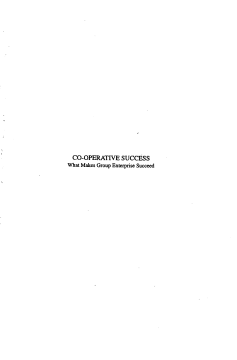
Additional Information
Book Details
Abstract
Using a broad definition of co-operatives as organizations with the majority ownership in the hands of its customers, suppliers or employees, this book identifies factors associated with successful group enterprises. It aims to help those who promote co-operative development to be more selective in choosing situations where this type of enterprise has a good chance of working, and offers guidelines and a blueprint for support staff. The book starts by identifying a tentative list of factors which are believed to be associated with co-operative success. It describes how the list was refined through a survey of expert opinion, a questionnaire and analysis of published literature. The main body of the text consists of case studies showing the range of co-operatives in operation and providing raw material for analysis. The study is directed towards co-operatives which prioritize poverty alleviation over economic success. The conclusion draws together the findings of the survey and attempts to identify patterns and commonalities. By combining a formal historical survey with case studies the book gives both a theoretical and experiential view of what is the 'middle' way between state ownership and the private sector. This book is of value to anyone who is involved in the possible establishment of a new group enterprise or advising, assisting or managing an existing one.
Table of Contents
| Section Title | Page | Action | Price |
|---|---|---|---|
| 000 Co-Operative Success | 1 | ||
| 001 Co-Operative Success | 9 | ||
| 002 Co-Operative Success | 19 | ||
| 003 Co-Operative Success | 31 | ||
| 004 Co-Operative Success | 44 | ||
| 005 Co-Operative Success | 56 | ||
| 006 Co-Operative Success | 68 | ||
| 007 Co-Operative Success | 73 | ||
| 008 Co-Operative Success | 89 | ||
| 009 Co-Operative Success | 100 | ||
| 010 Co-Operative Success | 111 | ||
| 011 Co-Operative Success | 121 | ||
| 012 Co-Operative Success | 147 |
